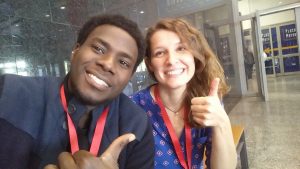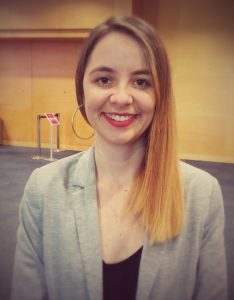How do you become data literate? Part 2
helene.hahn - May 29, 2017 in Uncategorized
What does it mean to become ‘data literate’? Where do you start and how can you use data within your work and projects? To explore these questions, we would like to introduce some of our community members and data activists from around the world, who ended up working with data at some point in their lives. We were curious about how they actually got started and – looking back now – what they would recommend to data newbies.
Each month we will publish a new interview, this is no. #2. Got feedback? Have questions? Feel free to get in touch: [email protected]
Oludotun Babayemi
Co-founder of Connected Development, Follow The Money Nigeria, data trainer at School of Data, from Nigeria
Topics: government spending, international aid, rural communities
Tweets: @dotunbabayemi
Introduce yourself.
My name is Oludotun Babayemi and I was a School of Data fellow in 2014. I co-founded an NGO called Connected Development in Nigeria three years ago and I run the project “Follow the Money”.
What topics and projects are you currently working on?
Well, I have a background in information management. And for the past nine years I’ve been involved in monitoring and evaluation of government programs, policies and projects, through multilateral and bilateral agencies. Data is getting more and more relevant in the non-profit sector and in the projects I run, which is called Follow the Money, that started in 2012. To follow the money we needed financial data, budget data and also we needed to look for baseline indicators of our target communities. Follow the Money tracks funds that are meant for capital projects and rural communities in the area of health, education and environment. So for us to make decisions on communities we want to create stories from, we needed these datasets. Data remains the core of our work. It became very important for us to leverage on data. For sustainability reasons as well, we needed to create a community of citizens who know how to use data. We have been offering trainings since 2013 to enhance data literacy skills in Nigeria to journalists and activists interested in the social sector. For every training that we ran we got great feedback and this showed us, that many people want to become data savvy. Data literacy helps us to get more people involved in our transparency project.
When was the first time you came across data and when did you start to use data in your work?
My story with data didn’t just start now. My mum is a teacher and when I was 8 years old, we used to compile result sheets of her student’s tests. Everytime she came home, she would give me spreadsheets on student’s test paper and ask me do to subtractions, additions, multiplications of the student’s results. So I was making remarks on their papers and would help in compiling the weighted average that determines their position. We would do this at the end of each term and I was helping her out on the spreadsheets. I started relating to data since then and that’s like 20 years ago.
How would you explain data literacy?
Data literacy is about empowering citizens on the use of data. That’s what it means to us. There is a lot of data available, but most people do not know, how to relate to it or how data does resonate with them. So it is our duty to connect the dots with them, to let them know, where they can find data and what they can use it for. You can use it to educate yourself, to create compelling stories and also to do effective advocacy. When you have the data and you know what the data is about, we say it is an evidence and with that evidence you can ask the right questions. So we say evidence is power.
What would you recommend to someone interested in data, but who does not know where to start?
If you want to start relating to data, I think it’s nice to find a community around you that works with data. There are also several Open Knowledge organisations in different countries you can join and be part of. One is working on Datenschule and there is schoolofdata.org also, so this should be one place to look out for. If you are in Africa, you can join the community of citizens holding their government accountable via the ifollowthemoney platform. This would at least encourage you and get you ready to start working with data.
Links:



